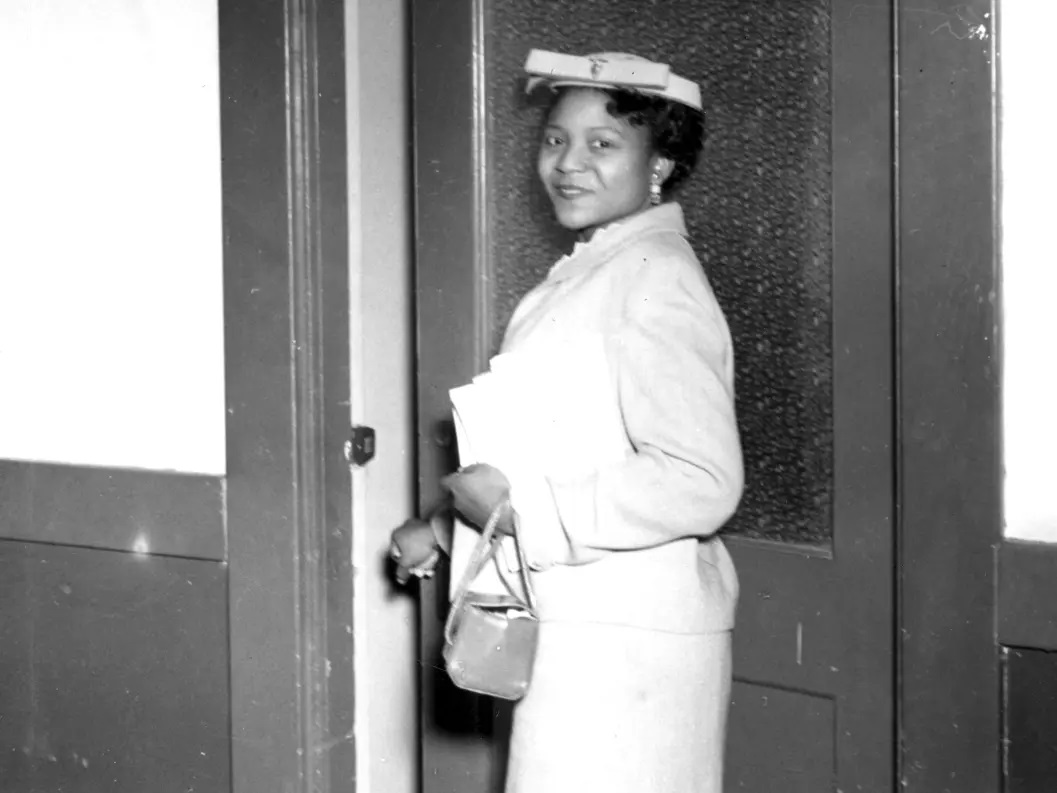Mississippi Today
On this day in 1956

On this day in 1956
FEBRUARY 3, 1956

Overcoming racism and threats, Autherine Lucy became the first Black student to attend graduate school at the University of Alabama. She had previously been accepted to the university, only to be rejected when university officials discovered she wasn't white.
The NAACP's Thurgood Marshall represented her on the appeal, and she worked in the meantime as an English teacher in Carthage, Mississippi. The U.S. Supreme Court ruled in her favor, and she entered the university as a graduate student in library science.
Despite riots and violence, she continued to attend. Three days later, the university suspended her “for her own safety,” prompting the president there to resign in protest.
Feeling dejected, she opened her mail soon after to read a letter from Marshall: “Whatever happens in the future, remember for all concerned, that your contribution has been made toward equal justice for all Americans and that you have done everything in your power to bring this about.”
Her case played a key role in desegregating schools in the South, including the University of Alabama, which admitted its first Black students in 1963. A quarter century later, the university overturned her expulsion, and she entered the graduation program in education a year later.
She graduated with a master's in 1992. The university named an endowed scholarship in her honor and unveiled a portrait of her in the student union, with an inscription that reads, “Her initiative and courage won the right for students of all races to attend the University.”
In 2010, the university unveiled the Autherine Lucy Clock Tower, which honored those who desegregated the university. When a special marker at the College of Education honored her, she returned to speak.
In 2019, she attended the university's graduation ceremony, where she received an honorary doctorate. “My response to fear is: do it anyway,” she said. “Let nothing stop you. You have to push forward.”
This article first appeared on Mississippi Today and is republished here under a Creative Commons license.
Did you miss our previous article…
https://www.biloxinewsevents.com/?p=207223
Mississippi Today
Remembering ‘The Gunslinger’ of college football, Archie Cooley


Archie “The Gunslinger” Cooley, the most unconventional of football coaches, has died at the age of 84, and, frankly, I don't even know how to begin to describe him.
So let's begin like this: There will never be another one. Cooley, which is how he referred to himself so often in the third person, was an original. In the mid-1980s, in Mississippi, he wrestled the college football spotlight away from Ole Miss, Mississippi State, Southern Miss and Jackson State, his alma mater, and shined it ever so brightly on Mississippi Valley State.

He was a sports writer's dream. Need a column? Call Cooley. He always delivered. He wore a cowboy hat, usually with a feather in it, and that hat covered a brain that was years and years ahead of all others when it came to offensive football.
Back when most college football teams were running “three-yards-and-cloud-of-dust” offenses, Cooley's MVSU Delta Devils were spreading the field, never huddling, and throwing the ball on every down and then throwing it some more. The stuff you see big-time college and NFL offenses doing now, he was doing then.
The only thing the Valley Delta Devils had more of than passing plays were nicknames. Cooley was The Gunslinger. Jerry Rice was World, short for All World. Willie Totten, the quarterback, was Satellite. The offense was The Satellite Express. The offensive line was known as Tons of Fun. Vincent Brown, the great linebacker, was The Undertaker. Together, they were a blast.
The first time I saw then in person was Sept. 24, 1984, when they came to Jackson to play one of W.C. Gorden's terrific Jackson State teams. Valley had scored 86 points in its opener and 77 points in its second game. Rice was catching about 20 passes and four touchdowns a game. Totten's passing stats were so gaudy that the NCAA chief statistician accused Valley sports information director Chuck Prophet of making them up. Prophet sent the NCAA the game films and said, “Correct me if I'm wrong.” He wasn't.
So Valley came to Jackson, drawing a crowd of more than 50,000, and on the first offensive play, the Devils flanked four wide receivers in single file to the left side and one wide receiver, the one wearing jersey number 88, to the far right. No. 88 was Jerry Rice and Jackson State had only one defensive back to cover him.
Well, you know what happened next. Rice ran right past the defender, Totten lofted a pass down the field, which Rice caught and gracefully ran to the end zone a good 10 yards ahead of the defender.
Valley won 49-32. During the game's final minutes, Cooley paraded up and down the Valley sideline, waving a green and white Valley banner. Valley had not defeated JSU in 30 years. Afterwards, he led the Valley players in a victory lap around the Memorial Stadium. “We've done the impossible!” Cooley, a former Jackson State All American center and linebacker, shouted.
“Now I know how they've been feeling for the last 30 years,” Cooley said, and he said a lot more.
“Jackson State said they had to score 30 points to win,” he said. “Ha! They would have had to score 50 because we scored 49. I'm gonna talk now because they have to live with it for a year.”
Cooley could ever more talk. He could brag and he could back it up. He was from the old Dizzy Dean school of boasters: “It ain't braggin' if you can do it.”
Cooley could do it and did.
He was a Laurel native, a graduate of tradition-rich Oak Park High School, also the alma mater of such famous Mississippians as Olympic long jumping champion Ralph Boston and world renowned opera soprano Leontyne Price. Cooley grew up with next to nothing. “A lot of times, growing up, I'd open the refrigerator for something to eat, and the only thing in there was water,” Cooley told me. “So, I'd drink a glass of water and go out and play football.”
He played center and linebacker at Jackson State. He was a defensive coordinator for years at Tennessee State before taking the job at Valley. He said all those years as a defensive coach, he kept a notebook of plays other teams used that he knew he wanted to use when he became a head coach. Clearly, most were passing plays.
And, yes, it helped to have a receiver like Rice and a quarterback like Totten, both now in the College Football Hall of Fame. But Cooley called the shots and he brought the cameras and microphones to Itta Bena, which is Choctaw for “Home in the Woods.” I remember trying to give driving directions from Jackson to Itta Bena to a reporter from The New York Times. He said I lost him at “turn right at the cotton gin.”
That 1984 Valley team was undefeated at the same time SWAC rival Alcorn State was undefeated through mid-October. They were scheduled to play in November in Itta Bena. A young Jackson sports columnist – this one – wrote a column that the game should be moved to Jackson where 50,000 more people could see it. So, they moved it to Jackson and played it on a Sunday. More than 64,000 people attended, which made it the biggest pay day in the history of either school. Marino Casem's Alcorn State Braves won 42-28 in a game never to be forgotten by anyone who was there.
Cooley would leave MVSU after the 1986 season and go on to coach at Arkansas Pine Bluff, Norfolk State and Paul Quinn College in Dallas. His teams never again rose to the prominence of those Valley teams when CBS, NBC, ABC, The New York Times and Sports Illustrated all found their way to Itta Bena, where they told the story of the highest scoring college football team in history and their leader, the self-proclaimed Gunslinger.
This article first appeared on Mississippi Today and is republished here under a Creative Commons license.
Did you miss our previous article…
https://www.biloxinewsevents.com/?p=351172
Mississippi Today
Legislative panels will consider restoring some Mississippians’ voting rights
The two legislative committee leaders responsible for criminal justice measures say they will move bills forward to restore suffrage for individuals, raising the prospect that some Mississippians will have their voting rights restored.
House and Senate Judiciary B Chairmen Kevin Horan and Joey Fillingane announced Friday that they will have hearings on Monday to consider the suffrage bills.
The House earlier in the session passed a substantial restoration bill that would have automatically restored suffrage to people convicted of nonviolent felony offenses, but Senate Constitution Chairwoman Angela Burks Hill killed it without bringing it up for debate.
Lawmakers, however, can still consider individual bills to restore suffrage to people who have been convicted of disenfranchising felony offenses, though only a small number of those bills typically survive the legislation process.
Horan, a Republican from Grenada, said the House will not restore suffrage to people convicted of violent offenses or those previously convicted of embezzling public money. Additionally, Horan said people must have completed the terms of their sentence and not have been convicted of another felony offense for at least five years to be considered.
Fillingane, a Republican from Sumrall, said the Senate also will likely only restore voting rights to people previously convicted of nonviolent felony offenses – not violent crimes such as murder or rape.
The Lamar County lawmaker also said the amount of time after someone has completed their sentencing terms is not a major factor in his decision to advance a suffrage bill out of committee or not.
“The further out the better, but the time since completing the sentence doesn't really matter,” Fillingane said.
Under the Mississippi Constitution, people convicted of any of 10 felonies — including perjury, arson and bigamy — lose their voting rights for life. Opinions from the Mississippi Attorney General's Office have since expanded the list of disenfranchising felonies to 23.
About 55,000 names are on the Secretary of State's voter disenfranchisement list as of March 19. The list, provided to Mississippi Today through a public records request, goes back to 1992 for felony convictions in state court.
The state constitution gives lawmakers the power to restore suffrage to citizens, but the process is burdensome. It requires two-thirds of lawmakers in both legislative chambers to vote in favor of restoring suffrage in individual cases.
“We have a process in the Legislature that helps to restore individuals' voting rights, but it is a terrible process,” Democratic Rep. Zakiya Summers of Jackson said on Wednesday. “And it's a cumbersome process. And there really is no easy way to navigate it.”
The Legislature last year did not pass any suffrage restoration bills, but a willingness from both of the relevant committee chairs to push some of the bills forward could mean lawmakers will approve some bills this year.
Lawmakers have until the final days of the session to vote on suffrage bills, and legislators are coming to the end of their regular session, but it's unclear when they will adjourn.
Legislators still have major items they can consider, Medicaid expansion legislation, addressing the public retirement system and rewriting the public K-12 funding formula.
This article first appeared on Mississippi Today and is republished here under a Creative Commons license.
Mississippi Today
Look for the “why” when engaging in disagreement

“Bought sense is better than borrowed sense” lives in my memory, rent-free. I've always cringed at it because, at every stage of life, some lessons have been costly to learn.
At the Alluvial Collective, we show up to the office, on the screen, or in a community with one overarching challenge: to create or deepen the connections that will support collective thriving. That is our “For what.” We get to show up with wisdom purchased over our organization's last 25 years of work and with wisdom borrowed from many generations and traditions. In most traditions, self-reflection and stories reveal the path to where we should go and how we should travel.
As you engage in the National Week of Conversation, here are a couple of stories and a few thoughts to help you show up for each other, our communities, and our country.
What Do You Need
The first story emerges from a book called “Getting To Yes,” about negotiating.
Two people were arguing over an orange, and after some time, they decided to split it in half, feeling that equal parts were fair, like in elementary school. Before splitting the orange, they never asked each other the reason the other wanted it. As it turns out, one wanted the orange peel to flavor a cake, and the other wanted the orange's “meat” to eat.
In another story, an arriving house guest is deeply offended by their host's demand that they remove their shoes upon entering their family home. The visit goes off the rails and probably off the porch, too.
Each of these stories reminds you of tensions and dilemmas that are all too familiar in our families, towns, and – for me – our leadership discourse. We have notions about what the other person, or people, want, but at critical points, we need more humanizing insight into what makes it essential to them.
The Cost of Wisdom
In the second story, the home's foyer had a large rug on its floor that had been in the family for generations. Understanding that, I would have offered to remove my shoes.
We benefit from being curious about the interests, the “for what” the other person engages with, rather than just the “what” or their position. It may seem inefficient, but it pales compared to the value curiosity brings to relationships. Good relationships are win-win; our team leans on telling and hearing stories to build relationships. They are the wellspring of “for whats” and “whys.”
The truthful stories that your neighbor or coworker tells to you and themselves comprise reality as they see it. Your stories teach your in-laws and teammates history from your the learned or experienced vantage point. Dialogue and stories make our actions and attitudes make sense. This is where trust begins to form.
Dialogue over Debates and Diatribes.
As you begin your week, remember that how we engage matters as much as why. Diatribes and speeches don't make us good neighbors, and debates require someone to lose. We like authentic connections and hearing familiar themes in the stories of others. This week, open and honest dialogue is the strategy; to thrive together should always be the goal. We've paid too much for everything else.
Talk more; proclaim less. It's one of our mottos here at The Center for Practical Ethics (TCPE). Put another way, we might say our goal is to foster conversations rather than diatribes. This task is more difficult than most realize. What we know as ethicists is that merely having conversations isn't enough. There's a wide variety of skills needed for fruitful dialogue to take place, and some are harder to come by than others.
The ideal conversation partner is curious and humble, able to actively listen, knowledgeable about his or her own positions, familiar with basic principles of logical argument, charitable when interpreting claims, and—most importantly—willing to be wrong. Our work centers around equipping students with these skills and helping them navigate the complex ethical issues within our society's most contentious disagreements.
This year, National Week of Conversations (NWoC) coincided with Ethics Week here at the University of Mississippi (UM). Many of our events are conversation-based because dialogue is the best way to evaluate the ideas of others and open ourselves up to new information and interpretation of facts, while gaining a better understanding of our own views.
Two of our events in particular are worth examining more closely to see why NWoC and the work we do at TCPE are critical for sustaining civil society and the myriad public goods we all take for granted. First is our signature Just Conversations event. Students are placed in small groups and given a couple of ethical dilemmas to discuss. Trained student moderators guide the discussion to point out important aspects of the dilemmas, such as logical fallacies, analysis of stakeholders, ethical concepts and assumptions, and varying methods to achieve goals. Students often discover they agree with others—on the dilemma outcome and the details—far more than they expected.
Second, we have invited free speech scholar Sigal Ben-Porath to give a talk about her new book Cancel Wars: How Universities Can Foster Free Speech, Promote Inclusion, and Renew Democracy. Ben-Porath contends that universities are laboratories of democracy where students must learn to engage with disagreement. If the university is to be a place where truth is discovered, it must take seriously its historic social and educational obligation to train students in the skills needed for civil discourse and critical thinking. Her work is especially relevant in our ever more polarized times.
What these events demonstrate is that conversations—that is, engaged and fruitful conversations—must take place at all levels. Students must learn to talk to students just as much as faculty must learn to talk to faculty and administrators to administrators. What's more, these groups must talk to each other because while each of us have a role within academia (faculty, staff, student, dean, vice chancellor, etc.), we are also all citizens who work and live together.
Policies must be made, votes cast, businesses founded, churches attended, friendships established, and life lived. TCPE focuses on the skills of civil discourse by providing opportunities to cultivate those skills through Ethics Week, and highlights conversations that ask us to reflect on the role of universities as part of the NWoC.

Join the conversation.
Join us at Noon on Friday, April 19 for a VIRTUAL lunch and learn session exploring tools to make us better listeners, and in turn, better equipped to engage in meaningful conversations across differences.
The session will be led by Dr. Graham Bodie, professor and Interim Chair of the Department of Media and Communication in the School of Journalism and New Media at the University of Mississippi.
This event is free and open to the public. Register to receive more information.
This article first appeared on Mississippi Today and is republished here under a Creative Commons license.
-
Mississippi News5 days ago
Mississippi will soon be bombarded with cicadas
-
SuperTalk FM4 days ago
4 tornadoes touched down in Mississippi during latest round of severe storms
-
SuperTalk FM2 days ago
Chance of parole denied for man who killed 3 Choctaw Indian tribal members
-
SuperTalk FM5 days ago
2 Jones County correctional officers arrested in smuggling bust
-
Mississippi News7 days ago
Columbus schools may see needed upgrades with bond issue
-
Local News5 days ago
Almost 3,500 Mississippi Veterans have enrolled in VA health care in past 365 days, 28% increase over last year
-
Kaiser Health News2 days ago
To Stop Fentanyl Deaths in Philadelphia, Knocking on Doors and Handing Out Overdose Kits
-
SuperTalk FM4 days ago
Amazon project in Madison County to be over $10B, create more jobs than projected: report








































